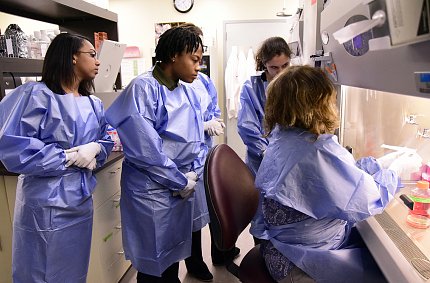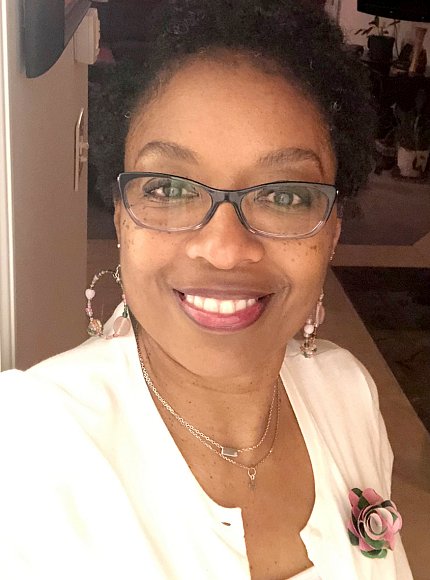HBCU-Connect
NIEHS Launches New Initiative with Historically Black Colleges, Universities

Photo: Steve McCaw/NIEHS
NIEHS recently unveiled HBCU-Connect, a new initiative to increase collaboration with students and faculty from Historically Black Colleges and Universities (HBCUs).
“NIEHS fosters an inclusive scientific discovery environment by providing educational opportunities for students of all ages and backgrounds,” said institute deputy director Dr. Trevor Archer, opening an event introducing the initiative. “Our goal is to inspire the development of environmental health science leaders from diverse backgrounds—in this case, from the HBCU community.”
HBCU-Connect is a multifaceted effort to strengthen ties between the institute and faculty and students at academic institutions that are often underrepresented in the sciences.

“The program we’re launching today is just the beginning of a larger effort,” said Dr. Ericka Reid, director of NIEHS’s Office of Science Education and Diversity (OSED), which sponsored the event. “We’re starting in the Triangle [Raleigh, Durham and Chapel Hill, North Carolina], but we’re also reaching out to HBCUs across the state and the region.”
She stressed the importance of mentoring to the success of HBCU-Connect.
“Students will be invited to lab meetings, staff meetings, science talks and other events,” Reid said. “NIEHS mentors will assist in any way they can to help you make decisions regarding your educational goals and career path.”
Research Training
Dr. Suchandra Bhattacharjee, manager of OSED’s Undergraduate Research Training Program, chaired a session on opportunities at NIH, including the Summer Internship Program, the Postbaccalaureate Intramural Research Training Award (IRTA) and the Undergraduate Scholarship Program (UGSP). Unique to NIEHS is the Scholars Connect Program.
There are almost 1,300 postbaccalaureate trainees across all 27 institutes and centers.
“UGSP [works with] students from financially disadvantaged backgrounds who make a commitment to health-related research,” UGSP director Dr. Darryl Murray said. “Providing NIH jobs is one of our goals.”
Katherine Hamilton of the NIEHS Office of Fellows’ Career Development emphasized that students do not need experience to be part of the summer program.
“You will work directly with a principal investigator or postdoc,” she said. “We will teach you everything you need to know.”
Second year NIEHS postbac IRTA fellow Princess Kamuche is now applying for medical school. Her advice is not to be daunted by challenges. “Don’t think that because a program is prestigious, you must be underqualified,” she said.
Glenn Jackson, a 2020-2021 Scholars Connect participant and recent graduate of North Carolina Agricultural and Technical State University, had similar advice.
“We discussed the imposter syndrome—the fear that you aren’t good enough—a lot,” he said. “That fear can prevent you from doing things. Give yourself confidence that you know you can do it. No one is born knowing anything.”
Career Paths
A session on career paths traced the professional trajectories of several NIEHS scientists and administrators. Seeking out mentorship was key for all.
Laboratory animal veterinarian Dr. Sheba Churchill said she decided on her career track in seventh grade, but still had twists and turns to deal with along the way. That’s when mentors are important, she said.
“I’ve never heard anyone say ‘No, I don’t want to talk to you,’” Churchill told attendees. “People love offering the benefit of their experience and helping you navigate different places, especially if they’ve been there.”
Dr. Dondrae Coble, chief of the Comparative Medicine Branch, said he takes pride in sharing his career success as an example to students. “When they see me, it lets them know that scientific professions are an option and obtainable,” he said.
NIEHS Stadtman investigator Dr. Jason Watts said that even after 10 years, he still talks regularly with his doctoral advisor. “The relationships you build can last your entire career,” he said.
IRTA postdoc fellow Dr. Cindo Nicholson said mentors can help you discover hidden interests. “They were a great help in discovering interests that lie dormant in you that you never really considered before,” he said.
Funding Opportunities
The last session brought together NIEHS Division of Extramural Research and Training staff to give an overview of grant mechanisms and funding opportunities for HBCU faculty.
Health scientist administrator Dr. Mike Humble described the K99/R00 Pathway to Independence Award. It is given to postdocs for the last two years of their research and they receive additional funding upon accepting their first faculty position.
That kind of award can be beneficial on the job market, he noted. “When you start applying for jobs, you can say, ‘I already have research funding.’”
For more information about OSED efforts, visit online https://www.niehs.nih.gov/health/scied/osed/index.cfm.
